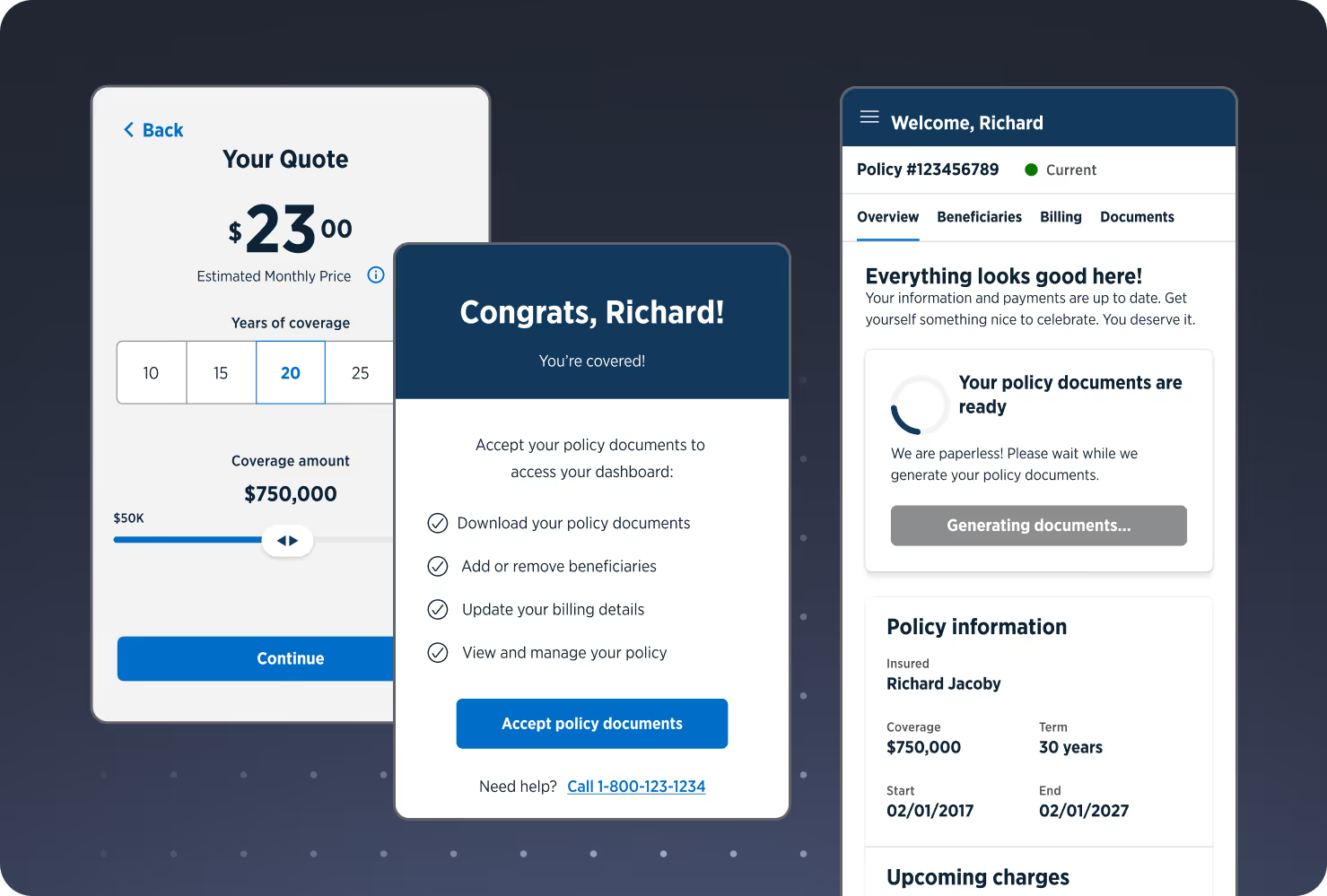These 5 tech innovations are setting the standard for life insurance. Is your org keeping up?

Technology isn’t just supporting the life insurance industry, it now plays the lead role — with digital innovation optimizing every touchpoint of the insurance lifecycle.
Carriers that once relied on legacy systems and manual processes have adopted intelligent platforms to maintain responsiveness and scalability in a digital-first world. From improving underwriting efficiency to enhancing customer experiences, life insurance tech innovations that felt new and novel just a few years ago are becoming standard practice, and even integral to staying competitive.
We'll explore five major ways continued adoption of life insurance technology has shaped industry expectations and standards in 2025, with real-time examples.
1. Thoughtful use of AI technologies is aiding skilled professionals
Use of artificial intelligence has become one of the most discussed forces in insurance — if not most industries at the moment.
It’s worth stating that not all AI platforms are equal, or risk-free. This is still a relatively new technology, which means understanding of its true potential (and the regulations that govern its ethical use) are still evolving.
With that said, these innovations come with the upside of vast potential and continuously emerging opportunities for greater operational capacity.
Strategic and thoughtful usage of AI in life insurance is helping to further empower skilled professionals. For example, certain platforms are being used to speed up repetitive tasks associated with underwriting — like searching through publicly available records, medical data, driving history, etc. — to identify areas of interest, patterns, or anomalies.
Across the industry, other measured applications of AI include fraud detection, policy lapse prediction, and process triage.
LIMRA’s report on sustained annuity demand throughout 2024 further highlights the need for scalable, intelligent tools that can help insurers manage high volumes without compromising accuracy.
To date, the most effective AI strategies have been those that work in harmony with experienced humans. These tools, which can improve efficiency, insights, and decisioning, are becoming much more commonplace.
2. Automation tech offers greater efficiency for underwriters
After years of investment and hype, automated underwriting for life insurance is now a vital foundational capability.
A recent EY study outlines how a majority of carriers are leveraging automation to reduce overall underwriting time and improve outcomes. Modern insurance underwriting software uses AI-powered models, automated rule sets, and streamlined workflows. These allow organizations to eliminate friction and increase processing speeds, ensuring consistent application of underwriting criteria.
When paired with automated underwriting platforms like Bestow’s underwriting tools, carriers are issuing policies faster and more cost effectively, while crucially maintaining full regulatory compliance. Decisions are no longer slowed by stacks of paperwork and legacy workflows, with underwriters better armed with relevant information or even freed up to spend more time on nuanced decisions that require expert judgment.
The benefits also extend past internal efficiency. Faster and more accurate underwriting builds trust, and enables carriers to deliver competitive products with shorter time-to-issue windows, providing a better customer experience. As underwriting continues to modernize, insurers are gaining increased accuracy and improved transparency, a core aspect for building stronger relationships with applicants.
3. Scalable cloud-based tech means launching products in months
The speed and efficiency at which insurance products can be made available has been crucial for some time. However, life insurance technology adoption across the industry means product cycles are now measured in months rather than years. As consumer preferences and regulatory requirements evolve quickly, cloud-based technology is allowing insurers to get new products to market fast, and to make product changes even faster.
Insurers are turning to life insurance software platforms to accelerate product development and testing. These cloud-native systems can offer speed, configurability, and sometimes built-in compliance that reduce launch timelines significantly.
Bestow’s Application Suite supports end-to-end digital and hybrid life insurance experiences. It empowers carriers to deploy modern, user-friendly solutions that fit neatly within their brand ecosystem, all with reduced development effort and greater strategic flexibility.
Bestow has outlined our pilot-first strategy: test rapidly, learn efficiently, and scale confidently. This approach not only boosts internal agility but also reduces risk, in turn giving teams the data they need to make optimal investment decisions.
With each passing quarter, more carriers are adopting this path, shifting away from legacy systems in favor of a cloud-based approach that enables faster response times in a quickly evolving marketplace.
4. Data technology and ecosystem integrations break down silos
Disconnected systems and data silos have been among the most persistent obstacles to insurance innovation. However, the industry is now embracing and investing heavily in data technology infrastructure and fully integrated ecosystems that allow for real-time data exchange, system interoperability, and intelligent automation across the policy lifecycle.
Insurers lean on platforms that can integrate easily with CRMs, policy admin systems, customer apps, and third-party data sources. The goal is simple: a complete, connected view of each customer and every policy journey.
Bestow’s Intelligence Suite supports API-enabled connections to unify workflows and support smarter decision-making. It offers internal teams and partners a variety of tools and capabilities from product performance views (both granular and high level) to marketing insights and sophisticated modeling environments.
Offering end-to-end visibility, actionable insights, and the ability to finally harness the power of one’s data, these newer data-centric technology stacks and ecosystem integrations are now highly coveted by carriers.
5. Customer experience takes the lead
With evolving technology comes higher consumer expectations — simplicity is now a minimum requirement. Rather than following internal industry trends, providers look to customer intelligence and data to intuitively and quickly enhance their all around experience with starting or continuing a policy.
Consumers want insurance to feel as simple as shopping online: transparent, fast, and easy to manage. Carriers are responding by investing in technology that shortens applications, provides real-time updates, and makes policy servicing a self-serve experience.
According to EY’s industry research, customer experience now leads all other factors (including cost and compliance) as the primary driver of technology investment. This represents a major shift in how insurers view their role: from policy providers to service platforms.
Bestow supports this evolution through our Administration Suite, which includes customizable customer portals, integrated agent tools, and automation to simplify life insurance applications. Customers can track their policy status, update information, manage beneficiaries, and more, from one intuitive interface.
A better experience goes beyond meeting expectations, it builds trust and drives retention, opening the door for future upselling opportunities and referrals. After initial investments, carriers are now seeing the payoff of customer-first thinking, with tech stack innovations geared towards providing an optimal experience.
In 2025, life insurance is technology forward
The message from the year so far is clear: the present and future of the industry is digital, integrated, and intelligent. Modernization has continued at pace and is vital to remaining competitive and relevant in a market evolving quicker than ever before.
Carriers embracing life insurance technology across underwriting, AI, platform design, and customer experience continue to compete by embracing advantages in speed, efficiency, and satisfaction. These capabilities are now a minimum requirement.
Providers partnering with platforms designed for agility and compliance, with long-term scalability at the forefront are giving themselves the best chance of continued growth in the marketplace.
Move fast and innovate with Bestow
We offer a digital-first platform built specifically for life insurance carriers. From underwriting and automation to ecosystem integrations and customer experience tools, we help insurers modernize with purpose.
With industry-leading solutions and a partner-first mindset, Bestow enables you to deliver smarter, simpler life insurance at scale.
Conclusion
FAQ
From the blog
The latest industry news, interviews, technologies, and resources.











.avif)

.svg)

